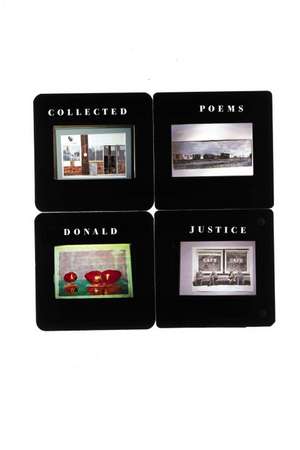Collected Poems
Autor Donald Justiceen Limba Engleză Paperback – 30 apr 2006
School Letting Out
(Fourth or Fifth Grade)
The afternoons of going home from school
Past the young fruit trees and the winter flowers.
The schoolyard cries fading behind you then,
And small boys running to catch up, as though
It were an honor somehow to be near—
All is forgiven now, even the dogs,
Who, straining at their tethers, used to bark,
Not from anger but some secret joy.
From the Hardcover edition.
Preț: 115.68 lei
Nou
Puncte Express: 174
Preț estimativ în valută:
22.14€ • 24.06$ • 18.61£
22.14€ • 24.06$ • 18.61£
Carte indisponibilă temporar
Doresc să fiu notificat când acest titlu va fi disponibil:
Se trimite...
Preluare comenzi: 021 569.72.76
Specificații
ISBN-13: 9780375710544
ISBN-10: 037571054X
Pagini: 289
Dimensiuni: 155 x 230 x 22 mm
Greutate: 0.46 kg
Editura: ALFRED A KNOPF
ISBN-10: 037571054X
Pagini: 289
Dimensiuni: 155 x 230 x 22 mm
Greutate: 0.46 kg
Editura: ALFRED A KNOPF
Notă biografică
Donald Justice was born in Miami, Florida, in 1925. He was the author of numerous books and the recipient of many grants and prizes, including the Pulitzer Prize for his Selected Poems (1979). He taught at several universities, chiefly the University of Iowa and the University of Florida. He lived with his wife in Iowa City until his death in August of 2004.
From the Hardcover edition.
From the Hardcover edition.
Extras
Nostalgia of the Lakefronts
Cities burn behind us; the lake glitters.
A tall loudspeaker is announcing prizes;
Another, by the lake, the times of cruises.
Childhood, once vast with terrors and surprises,
Is fading to a landscape deep with distance–
And always the sad piano in the distance,
Faintly in the distance, a ghostly tinkling
(O indecipherable blurred harmonies)
Or some far horn repeating over water
Its high lost note, cut loose from all harmonies.
At such times, wakeful, a child will dream the world,
And this is the world we run to from the world.
Or the two worlds come together and are one
On dark, sweet afternoons of storm and of rain,
And stereopticons brought out and dusted,
Stacks of old Geographics, or, through the rain,
A mad wet dash to the local movie palace
And the shriek, perhaps, of Kane's white cockatoo.
(Would this have been summer, 1942?)
By June the city always seems neurotic.
But lakes are good all summer for reflection,
And ours is famed among painters for its blues,
Yet not entirely sad, upon reflection.
Why sad at all? Is their wish so unique–
To anthropomorphize the inanimate
With a love that masquerades as pure technique?
O art and the child were innocent together!
But landscapes grow abstract, like aging parents.
Soon now the war will shutter the grand hotels,
And we, when we come back, will come as parents.
There are no lanterns now strung between pines–
Only, like history, the stark bare northern pines.
And after a time the lakefront disappears
Into the stubborn verses of its exiles
Or a few gifted sketches of old piers.
It rains perhaps on the other side of the heart;
Then we remember, whether we would or no.
–Nostalgia comes with the smell of rain, you know.
From the Hardcover edition.
Cities burn behind us; the lake glitters.
A tall loudspeaker is announcing prizes;
Another, by the lake, the times of cruises.
Childhood, once vast with terrors and surprises,
Is fading to a landscape deep with distance–
And always the sad piano in the distance,
Faintly in the distance, a ghostly tinkling
(O indecipherable blurred harmonies)
Or some far horn repeating over water
Its high lost note, cut loose from all harmonies.
At such times, wakeful, a child will dream the world,
And this is the world we run to from the world.
Or the two worlds come together and are one
On dark, sweet afternoons of storm and of rain,
And stereopticons brought out and dusted,
Stacks of old Geographics, or, through the rain,
A mad wet dash to the local movie palace
And the shriek, perhaps, of Kane's white cockatoo.
(Would this have been summer, 1942?)
By June the city always seems neurotic.
But lakes are good all summer for reflection,
And ours is famed among painters for its blues,
Yet not entirely sad, upon reflection.
Why sad at all? Is their wish so unique–
To anthropomorphize the inanimate
With a love that masquerades as pure technique?
O art and the child were innocent together!
But landscapes grow abstract, like aging parents.
Soon now the war will shutter the grand hotels,
And we, when we come back, will come as parents.
There are no lanterns now strung between pines–
Only, like history, the stark bare northern pines.
And after a time the lakefront disappears
Into the stubborn verses of its exiles
Or a few gifted sketches of old piers.
It rains perhaps on the other side of the heart;
Then we remember, whether we would or no.
–Nostalgia comes with the smell of rain, you know.
From the Hardcover edition.
